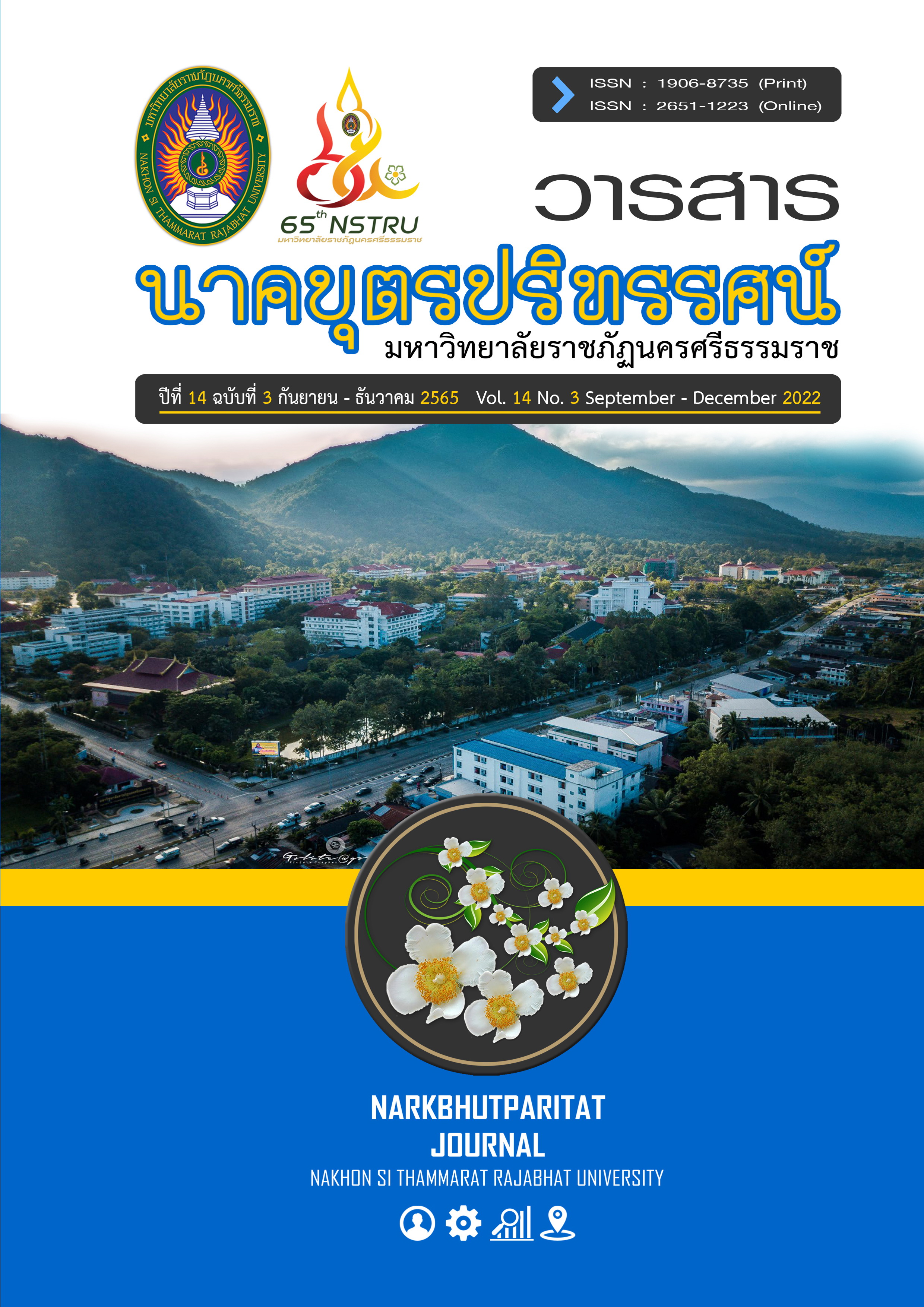ความสัมพันธ์ระหว่างภาวะผู้นำเชิงวิสัยทัศน์ของผู้บริหารกับประสิทธิผลของสถานศึกษาสังกัดสำนักงานเขตพื้นที่การศึกษามัธยมศึกษานครศรีธรรมราช
Main Article Content
บทคัดย่อ
การวิจัย เรื่อง ความสัมพันธ์ของภาวะผู้นำเชิงวิสัยทัศน์ของผู้บริหารกับประสิทธิผลของสถานศึกษา
เป็นประเภทงานวิจัยเชิงพรรณนาทางสังคมศาสตร์ มีวัตถุประสงค์เพื่อศึกษาระดับและความสัมพันธ์ของภาวะผู้นำ
เชิงวิสัยทัศน์ของผู้บริหารที่ส่งผลกับประสิทธิผลของสถานศึกษา และแนวทางการพัฒนาภาวะผู้นำเชิงวิสัยทัศน์
ของผู้บริหารสถานศึกษา สังกัด สำนักงานเขตพื้นที่การศึกษามัธยมศึกษานครศรีธรรมราช จากกลุ่มตัวอย่าง จำนวน 475 คน ประกอบด้วย ผู้บริหาร จำนวน 118 คน และครูผู้สอน จำนวน 357 คน โดยมีแบบสอบถามเป็นเครื่องมือ
ในการวิจัย สถิติที่ใช้ในการวิเคราะห์ข้อมูล ได้แก่ ค่าร้อยละ ค่าเฉลี่ย (Mean) ค่าเบี่ยงเบนมาตรฐาน (Standard Deviation : S.D.) ค่าสัมประสิทธิ์สหสัมพันธ์แบบเพียร์สัน (Pearson’s Product-Moment coefficient of Correlation) ค่าการถดถอยพหุคูณแบบขั้นตอน (Stepwise Multiple Regression Analysis) และการวิเคราะห์เอกสาร (Content Analysis)
ผลการวิจัยพบว่า
- ระดับภาวะผู้นำเชิงวิสัยทัศน์ของผู้บริหาร พบว่า ค่าเฉลี่ยโดยรวมอยู่ในระดับ มาก ( )=4.10) (S.D.=0.64)
- ระดับประสิทธิผลของสถานศึกษา พบว่า มีค่าเฉลี่ยโดยรวม อยู่ในระดับ มาก ( )= 4.13) (S.D.=0.57)
- ความสัมพันธ์ระหว่างภาวะผู้นำเชิงวิสัยทัศน์ของผู้บริหารกับประสิทธิผลของสถานศึกษา พบว่า
มีความสัมพันธ์ในเชิงบวก (rxy=.869) อย่างมีนัยสำคัญทางสถิติที่ระดับ .01 และผลการวิเคราะห์การถดถอยพหุคูณแบบขั้นตอน พบว่า ภาวะผู้นำเชิงวิสัยทัศน์ของผู้บริหารที่ส่งผลต่อประสิทธิผลของสถานศึกษา และสามารถทำนายประสิทธิผลของสถานศึกษาได้ร้อยละ 76.20 (R2=.762) - แนวทางการพัฒนาภาวะผู้นำเชิงวิสัยทัศน์ของผู้บริหารสถานศึกษา คือ การยึดหลักการมีส่วนร่วมในการพัฒนาตามบริบทของสถานศึกษา โดยมีโมเดลการบริหารสถานศึกษา น้อมนำศาสตร์พระราชามาบริหารจัดการ มีระบบนิเทศติดตาม การสร้างชุมชนแห่งการเรียนรู้ และมีแนวทางการพัฒนาประสิทธิผลของสถานศึกษา คือ การยึดหลักการพัฒนาตามแนวการประกันคุณภาพการศึกษา มีกระบวนการจัดการเรียนรู้ที่เน้นผู้เรียนเป็นสำคัญ และพัฒนาส่งเสริมผู้เรียนรอบด้านตามความถนัด
Article Details

อนุญาตภายใต้เงื่อนไข Creative Commons Attribution-NonCommercial-NoDerivatives 4.0 International License.
เอกสารอ้างอิง
Anannawee, P. (2016). Principles, theories of education administration, (4th ed.). Chonburi: Montri publishing
Boonnak, S. Sonchan, C. and Prommuangkun, S. (2019), The relationship between visionary leadership of administrators and effectiveness of management of mahamakut buddhist university, Journal of Graduate School Sakon Nakhon Rajabhat University, 16(74) , 191-110.
Chiangklang, O. (2019). The relationship between Visionary leadership of school administrators and work performance competency of teachers in schools under Buriram primary education service area office 3. the (Master of Education) Rajabhat Buriram University Program in Educational Administration.
Jongvisan, R. (2015). Leadership: Theories, research, and approaches to development, Bangkok. Chulalongkorn University Press.
Krejcie, R. V. and Morgan, D. W. (1970). Determining Sample Size for Research Activities. Educational and Psychological Measurement.
Matthew L. Montgomery. (2020). Education vision in the 21st century: a quantitative study of the effect of superintendent vision on digital learning. Unpublished doctoral dissertation, Kent State University, Ohio.
Melissa A. Amen. (2019). A Relationship Between Mission Statements and School Effectiveness in Faith-Based Elementary Schools in the State of Nebraska. Unpublished doctoral dissertation, Northcentral University, Arizona.
Maturos, S. (2019). Thai education 4.0 in the context of school administrators, Nakhon Lampang Buddhist College’s Journal, 8(2) : 267-278.
Nachai, K. (2017). The relationship between the visionary leader of education administrations and the effectiveness of the schools in phanat nikhom group 2 under Chonburi primary educational service area office 2. (The Master of Education Degree) Burapha University. Educational Administration
Pratoom, J. (2016). Factors affecting the school effectiveness under the secondary educational service area office 27. (The Master of Education Degree) Burapha University. Educational Administration
Pianpitake, R. (2016). The visionary leadership affecting academic dministration in school under the office of secondary education – area 6. the (Master of Education) Rajabhat Rajanagarindra University Program in Educational Administration.
Powpan, Ch. (2017). Fundamental Concepts and Theories for being Leaders of School Administrators in the 21stcentury, Journal of Educational Administration Khon Kaen University, 12(1), 1-9.
Pongngam, K. (2017). The academic leadership affecting the effectiveness of primary schools under the office of Chachoengsao primary educational service area 1. the (Master of Education) Rajabhat Rajanagarindra University .Program in Educational Administration.
Raj K. Mitra. (2019). The University of south alabama Mitchell college of business visionary leadership and role ambiguity: impact of Psychological safety in healthcare teams. (Doctoral dissertation, University of South Alabama, 2019).
Sanoi, N. (2017). A study of factors influencing to visionary leadership for school administrators of primary educational service area office lower northern. (Master of Education) Naresuan University . Educational Administration.
Wechayaluck, N. (2017). Leadership of administrators, Bangkok. Chulalongkorn University.


